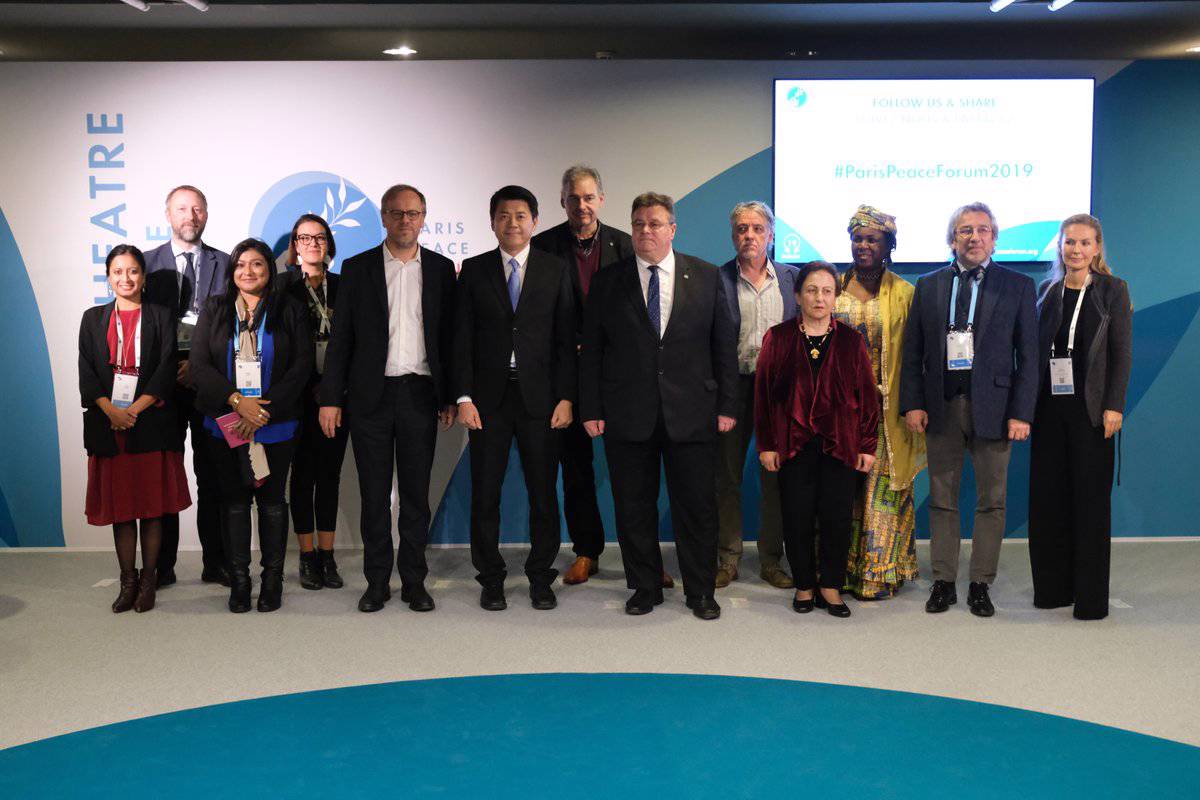
PRIO is one of eleven organizations from civil society who have created the Forum on Information and Democracy, a new international entity tasked with implementing the principles of the International Partnership on information & Democracy, an intergovernmental agreement signed by a coalition of 30 States on the margins of the UN General Assembly last September. It is the continuation of the international process launched by Reporters Without Borders (RSF) in September 2018.
In the context of the Paris Peace Forum today, eleven organizations - including PRIO - unveiled the newly created Forum on Information & Democracy. This new entity will issue recommendations for standards in order to encourage the regulation and self-regulation of information and communication. The initiative was welcomed by French President Emmanuel Macron during his inaugural speech. He first quoted "the Partnership on Information and Democracy, launched by Reporters Without Borders and supported by governments" to illustrate "the importance of these new forms of cooperation", "a concrete example of innovations that provide different actors to move forward together".
The association will be based in Paris and will implement the principles from the International Partnership on Information & Democracy, an intergovernmental agreement endorsed by a coalition of 30 States on the margins of the UN General Assembly.
The first General Assembly of the Forum on I&D was held yesterday at RSF's headquarters in Paris. Its eleven founding members are NGOs, think tanks, multistakeholder initiatives and research centers: CIGI (Canada), CIVICUS (South Africa), the Digital Rights Foundation (Pakistan), Free Press Unlimited (Netherlands), the Human Rights Centre at UC Berkeley School of Law, University of California (United States), the Institute for Strategic Dialogue (United Kingdom), OBSERVACOM (Uruguay), the Open Government Partnership, the Peace Research Institute Oslo (Norway), Reporters without Borders/RSF (France) and Research ICT Africa (South Africa).
The Forum's Board of Directors elected the RSF Secretary general, Christophe Deloire as its President. Nighat Dad (executive director of Digital Rights Foundation) and Leon Willems (director of Free Press Unlimited) were elected as Vice-President and Treasurer.
In accordance with its bylaws, the Forum will evaluate the means, norms and architectures of the global space of information and communication; investigate respect for the principles of the Declaration and Partnership on Information and Democracy by the corporate entities that shape this space (the online platforms); and, above all, issue recommendations for governments, platforms and the media industry on how the norms that govern this space should evolve. It will encourage self-regulatory mechanisms and promote the social function of journalism.
The Forum's permanent secretariat will set up working groups tasked with formulating recommendations for regulation and self-regulation in order to address new challenges brought up by technological disruptions and for which existing legislation is not adapted.
During the inauguration of the Forum on Information & Democracy, the President of Latvia Egils Levits, the Minister of Foreign Affairs of Lithuania Linas Linkevičius, the Chancellor of South Korea's National Diplomatic Academy, Kim Joon Hyung, and the Council of Europe's Director of Democratic Governance, Claudia Luciani, recalled the importance of the Partnership. Some founding members, including the CEO of the Institute for Strategic Dialogue, Sasha Havlicek, the Executive Director of the Peace Research Institute Oslo, Henrik Urdal and the Head of the Geneva office of CIVICUS, Susan Wilding explained the importance and the need for this new organization. Christophe Deloire and Shirin Ebadi, the co-chairs of the International Commission on Information and Democracy (see below), and three other members of the Commission, Can Dündar, Hauwa Ibrahim and Nighat Dad, also outlined the overall logic of the initiative and the central place given to civil society.
About the International Initiative on Information and Democracy
RSF launched this international initiative in September 2018 when it created the International Commission on Information and Democracy consisting of 25 prominent figures of 18 nationalities. This Commission is co-chaired by Christophe Deloire, RSF Secretary-General and Nobel Peace Prize laureate Shirin Ebadi.
Other members of the Commission include laureates of the Nobel Prize in Economic Sciences Joseph Stiglitz and Amartya Sen, the French jurist Mireille Delmas Marty, Honorary Professor at the Collége de France, journalists Maria Ressa and Can Dündar, and new technology expert Yochai Benkler, co-director of the Berkman Klein Centre at Harvard University.
The Commission drafted the International Declaration on Information and Democracy which received the support of twelve Heads of State and Government in November 2018, including Emmanuel Macron (France), Carlos Alvarado (Costa Rica), Bechir Caid Essebsi (Tunisia), Erna Solberg (Norway) and Justin Trudeau (Canada). It also received the support of the UN Secretary-General, Antonio Guterres, UNESCO Director-General, Audrey Azoulay, and the Secretary-General of the Council of Europe, Thorbjørn Jagland.
The ensuing Partnership for Information and Democracy was presented at the G7 summit in August 2019, winning the support of G7 members and the leaders of other major democracies also attending the summit.





